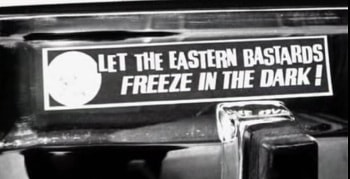Can Alberta Get Off The Oil Roller Coaster?

 Alberta brought down a budget on Thursday, featuring multi-billion dollar deficits for the next several years, tax hikes for the wealthy, program cuts for everyone, and the looming spectre of major job losses in the oil industry.
Alberta brought down a budget on Thursday, featuring multi-billion dollar deficits for the next several years, tax hikes for the wealthy, program cuts for everyone, and the looming spectre of major job losses in the oil industry.
Also happening last week in Edmonton was the World Heavy Oil Congress, probably the saddest, angriest place to be outside of a devastated One Direction fan club meeting.
Premier Jim Prentice, while promising to help his province “get off the oil roller coaster”, has also said, “With little or no influence over oil prices, it is simply irresponsible for Alberta to rely on these unstable revenues to fund health, education and other vital public services that Albertans depend upon.”
Alberta produces about three million barrels of oil per day, and it has “no influence” over oil prices. Meanwhile, OPEC, or really just Saudi Arabia who produces around nine million barrels a day, basically decides where oil prices are going to sit for the indefinite future for whatever short-term political goals the Saudi royal family hopes to achieve. Maybe they’re punishing Russia. Who knows? They’re not talking.
In any case, Prentice is probably the only head of a major oil-producing power to admit in public that his government is powerless to do anything to protect the viability of its primary source of income.
Of course, none of this would be happening if the price of oil had remained where it was a year ago, hovering over $100. And now that its value has fallen to less than half that amount, caused by a refusal on the part of Saudi Arabia to boost oil production, coupled with a boom in shale gas exploitation in the United States, the Alberta government is caught off guard and scrambling to come to grips with reality.
The atmosphere at the World Heavy Oil Congress last week could probably best be described as “heavy”, with attendance down 20% from the previous year and this year’s stated theme being “Producing More With Less”.
Somehow over the last five years or so, fans managed to convince themselves that One Direction was going to last forever. Unfortunately, nothing lasts forever.
The Alberta government is now promising that in future, it will treat oil revenue as a “windfall” that it socks away as a supplement to the real economy, aka. people working and making products and focusing on technological innovation.
Hindsight is 20-20, and you can’t change the past. The Alberta government is going to start doing now what they ought to have been doing for decades. But what could they have done differently?
Since the downturn in the price of oil, several journalists have pointed out that Norway had the good sense, back when the good times were really rolling, to put a little something to the side in the form of a sovereign wealth fund that now sits at over $1 trillion.
That is a pile of rainy day money to the tune of $177,000 for each and every Norwegian. And now, like the song says, here’s that rainy day.
Albertans, pushing back against the Norway comparison, admit that while “there’s no question that Alberta has done a bad job of managing the wealth that its oil and gas sector has been throwing off for more than half a century,” there is also no comparison to be made between the short-sighted decision making process that has put Alberta in a bind today and the thrifty-minded pragmatism of Norwegians.
The Alberta argument against Norway’s wealth fund basically amounts to, “That’s socialism.”
Well, have fun with that. Alberta may have no sales tax, but they’ll get by on a diet of freedom.
Schadenfreude, taking pleasure in the suffering of others, is not an attractive human characteristic. But it shouldn’t come as much of a surprise that watching the oil party dry up in Alberta is not a total source of unalloyed sorrow from coast to coast to coast, the way that it has been for attendees at the World Heavy Oil Congress last week.
“There’s no question that Alberta has done a bad job of managing the wealth that its oil and gas sector has been throwing off for more than half a century.” – Alberta Oil magazine
 Since the 1970s, when Alberta’s oil boom really kicked in, Alberta has pretty much lorded it over the rest of Canada, resenting every dime in transfer payments sent eastward, with Calgary mayor Ralph Klein responding to the Trudeau government’s National Energy Program, “Let the Eastern bastards freeze in the dark,” which literally became a bumper sticker decorating the cars of proudly anti-NEP Albertans.
Since the 1970s, when Alberta’s oil boom really kicked in, Alberta has pretty much lorded it over the rest of Canada, resenting every dime in transfer payments sent eastward, with Calgary mayor Ralph Klein responding to the Trudeau government’s National Energy Program, “Let the Eastern bastards freeze in the dark,” which literally became a bumper sticker decorating the cars of proudly anti-NEP Albertans.
In the 1930s, when prairie farmers were basically eating dirt, railroad cars full of apples, turnips, milk and salt cod rolled from the Maritimes to the devastated farms of the dust bowl. There was no formal program of equalization payments in place at the time. Maritimers did that because they’re nice people.
And then, when the equalization program was finally implemented in 1957, Albertans began snarking about being forced to send welfare payments to hapless no-hope fishermen.
Maritimers tend to have a long memory when it comes to people from the west saying things like, “Let the Eastern bastards freeze in the dark.” So now that Alberta is in trouble again, Easterners can perhaps  be forgiven for gritting their teeth a little, after decades of the middle finger coming back at them from the direction of the prairies.
be forgiven for gritting their teeth a little, after decades of the middle finger coming back at them from the direction of the prairies.
Ralph Klein would only have needed to ask his parents what times were like back in their day, and who was there to help them out when things got really tough in the prairies. Klein’s dad was dirt poor, riding the rails during the Depression before suiting up to become Phil “The Killer” Klein on the professional wrestling circuit.
Meanwhile, the future is in technology, as Bay Street has been noticing over the past year or so, with smart capital looking for a refuge from collapsing oil prices.
The development of an energy strategy that involves a diverse portfolio of technological solutions to energy challenges is vital to Alberta’s, and Canada’s, future.
As James Byrne and Paul Hazendonk of the University of Lethbridge point out, writing for the Edmonton Journal, “Alberta needs an energy strategy that protects our current economy and facilitates diversification beyond fossil fuels.”
While China and India react to the effects of obvious, visible pollution and make heavy investments in clean technology, Alberta can either double down on the oilsands, hoping that prices eventually rebound, or it can diversify and “get off the oil roller coaster”, as Jim Prentice now has no choice but to do.
https://www.youtube.com/watch?v=KFjiDUd7QmA

Terry Dawes
Writer

